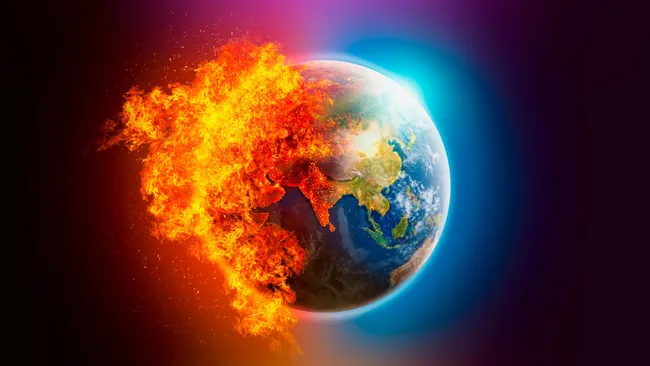- 22 April 2024
- 720
Understanding the Impact of Climate Change Shocks in Europe: A Wake-Up Call for Action

Climate change is no longer a distant threat but a harsh reality, with 2023 marking a year of unprecedented disruption and misery for millions across Europe. The UN weather agency’s recent report sheds light on the alarming trends that indicate a “new normal” characterized by widespread flooding and severe heatwaves. In this article, we delve deeper into the findings of the report, exploring the implications and emphasizing the urgent need for adaptation and mitigation strategies.
The Warmest Year on Record
2023 was identified as the joint warmest or second warmest year on record in Europe, highlighting the persistent and escalating nature of climate change. According to data from the World Meteorological Organization (WMO) and the Copernicus Climate Change Service, this alarming trend is a cause for concern, demanding immediate attention and action from policymakers and citizens alike.
Rising Temperatures and Heat-Related Mortality
The rise in temperatures has led to a surge in heat-related mortality, with a staggering increase of around 30 percent in the past two decades. The adverse effects of extreme heat stress are becoming increasingly evident, posing significant challenges to public health and well-being across European regions.
Adverse Health Impacts and Extreme Weather Events
The 2023 European State of the Climate report highlights a concerning increase in adverse health impacts resulting from extreme weather and climate events. These events not only jeopardize human health but also disrupt ecosystems and exacerbate existing vulnerabilities, underscoring the urgent need for proactive measures to mitigate risks and build resilience.
Public Perception and Early Warning Systems
Despite the escalating risks, there remains a low-risk perception among members of the public and some health providers regarding the dangers of heat exhaustion. To address this challenge, early warning systems such as the WMO’s Regional Climate Centre’s Climate Watch play a crucial role in raising awareness and promoting preparedness for impending extreme weather events.
Impact on Precipitation and Flooding
In addition to rising temperatures, Europe witnessed a seven percent increase in rainfall in 2023, leading to record river flows and widespread flooding. The intensity and frequency of floods surpassed previous thresholds, posing significant challenges to infrastructure, agriculture, and livelihoods in affected regions.
Record High Sea Surface Temperatures
Record sea surface temperatures further accentuated the climate crisis, with an alarming marine heatwave observed in the Atlantic Ocean west of Ireland and around the United Kingdom. These extreme events underscore the interconnected nature of climate impacts, highlighting the need for comprehensive and coordinated responses at local, national, and global levels.
Embracing Renewable Energy and Building Resilience
Despite the challenges posed by climate change shocks, there are glimmers of hope in Europe’s transition towards renewable energy sources. The report highlights a record increase in electricity generation using renewable technology, driven by above-average wind and hydroelectric power production. These advancements signify progress towards sustainability and resilience in the face of climate adversity.
Challenges in Snowfall and Glacier Ice Loss
However, the transition to renewable energy is not without its challenges, as evidenced by variations in solar panel power generation and declining snowfall across central Europe and the Alps. The loss of glacier ice in the Alps serves as a stark reminder of the profound impact of climate change on fragile ecosystems and natural landscapes.
Arctic Concerns and Wildfire Emissions
The report also draws attention to the alarming trends in the Arctic, with temperatures ranking among the warmest on record and sea ice extent remaining below average. The increase in wildfire carbon emissions further exacerbates the climate crisis, emphasizing the interconnectedness of global climate systems and the urgency of collective action.
A Call to Action
In conclusion, the findings of the 2023 European State of the Climate report serve as a wake-up call for action. Climate change shocks are no longer distant threats but immediate realities that demand urgent and concerted efforts from governments, businesses, and individuals alike. By embracing renewable energy, strengthening early warning systems, and prioritizing adaptation and mitigation measures, we can build a more resilient and sustainable future for generations to come.
_____________________________________________________________________________________
FAQs
How does climate change affect extreme weather events in Europe?
Climate change exacerbates extreme weather events such as heatwaves, floods, and storms by altering atmospheric patterns and increasing the frequency and intensity of these events.
What role do early warning systems play in mitigating the impacts of climate change?
Early warning systems provide vital information and alerts to communities, enabling them to prepare for and respond to impending extreme weather events, thus reducing the associated risks and damages.
What are some of the key challenges in transitioning to renewable energy in Europe?
Challenges in transitioning to renewable energy include variability in energy production from sources such as wind and solar power, as well as the need for infrastructure upgrades and policy support to facilitate the transition.
How can individuals contribute to mitigating climate change impacts?
Individuals can contribute to mitigating climate change impacts by reducing their carbon footprint through actions such as energy conservation, sustainable transportation, and supporting renewable energy initiatives.
What is the significance of addressing climate change at the global level?
Addressing climate change at the global level is crucial as it requires collective action and cooperation among nations to mitigate greenhouse gas emissions, protect vulnerable populations, and preserve the planet’s ecosystems for future generations.

